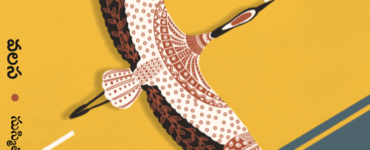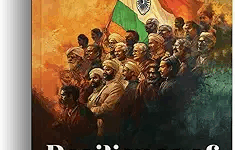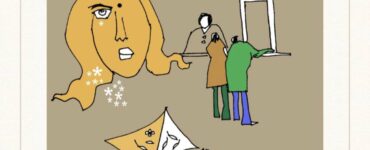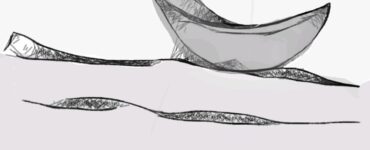Telugu: Dr.V. Chandra Sekhar Rao
Mohini standing by herself in front of Santosh cinema. Nine in the morning. Hyderabad with rain clouds.
A few delegates here and there. I, who had imagined that a huge crowd would have surrounded Mohini asking her questions or seeking her autograph, felt sad. Before I could go and say hello, Manohar descended with a flourish. With him, film society youngsters. As soon as he saw Mohini, with a show of excitement, he pulled her close in a very cinematic vein. It was like a scene in some Filmfare.
Spotting me, he said, “Oh! My writer is also here!” He turned to the people next to him and said, “Look at him! He who looks so ordinary can write fiction that makes one’s hair stand on end. He wrote the script for this film. And you know, he’s a Dalit writer.” Saying this, he looked towards me and said, “Come close! Niranjan! Introduce yourself!”
I had already imagined this scene. I do not know why I imagined it would be exactly like this but—I knew that, just like this, with such a put-on face, in such a dramatic manner, this man would speak. Perhaps Mohini also knew. All the three, behaving as if this were a well-rehearsed shot in a film, made me laugh.
By the time I entered the theatre, the lights had been turned off. On the dais near the screen, a woman from IFFI was introducing Manohar. “In this film we have used the technique Mrinalda had used in Akaler Sandhane. Writing the script for each day that very day, re-inventing a tragedy, we shot this film. They are referring to this film as a Dalit film. The question is whether pain can be of two kinds—pain of Dalits or pain of non-Dalits!” Then they asked Mohini to come. Except for folding her hands to do a namaste, she did not speak a word. Addressing me as “Niranjan, the script writer” surprised me. I had assumed that as far as the film was concerned my name was not involved. “This film is about the death of a woman leader of a Dalit movement. The film begins with the hacked pieces of the murdered woman dropping from the sky. That same village, in front of the very same people. Re-creating the tragedy of an incident is a great experience. Thank you.” Saying this, I got down from the dais.
A morning in Reddypuram. It is like any other ordinary morning in a village. Those going to the fields, those driving the cattle for their feed—the early morning sun, like silver streaks through a silhouette—the film begins there.
A stream at the edge of the village. A little distance from the stream, a temple—the village looks like a wonderful painting in the aerial shot. Suddenly, a horrendous shriek. In the close-up—near the stream, in front of the temple, a ten year old girl. In front of the temple a piece of the foot sliced off from the person. The sun has disappeared and black clouds envelop the village. That girl comes shouting into the village. In the village huge crowds of people. In everyone’s face fear and anxiety. Hacked pieces from the body on housetops, on electric poles and in the middle of the streets.
In a close-up shot, people are examining the chopped hand. The bangles on that hand and the thin and sleek fingers. “Malati!” shouts a middle-aged woman in fear. “Yes, it’s Malati!” “Oh, no! Oh, God! Oh, God, they’ve killed Malatamma!” Women’s’ wails. Women and children come running in hordes from the Dalitawada. Ten youth go together and are searching in the outskirts of the village, on the banks of the stream, and in the wells. Children go towards the stream and stir the waters. Thinking that they would find a chopped-off leg, a split head or a floating foot. Two children spot a skeleton of a hand with completely rotten skin and shrunken muscles while playing in the slush next to the stream. They tie it up in a towel and bring it. In the well, on another side, they find two pieces of the torso. After a long time, the police, the sarpanch and hundreds of people swarm in. A scene of sadness of people rushing in from neighbouring villages. Sadness and anger on people’s faces. Press people getting off the cars hurriedly and running, readying their cameras. Police getting off from a big convoy—the area looks like a huge battlefield. People are speaking with intense sadness about Malati. Each one is speaking of their closeness to Malati. Each introduction like a flashback—Malati’s pain is being unveiled.
* * *
It took almost ten days for the opening shots. The hacked pieces sliding down from the sky like that—picturisation was very tough. After the completion, the shots turned out to be wonderful…Manohar was very excited.
Oneday, the shooting being cancelled as it was very cloudy—it was a week since the shooting began. Yadamma came at ten in the morning. “The bastards killed that girl!” Saying this, she started crying. Mohini came out worried. Then Sandeep (who acted Sundaram’s role), Manorama, Kashyap, Romi—all came out worried. Yadamma’s relationship to Malati was that of an aunt. Slumping on to the steps, saying, “How wonderfully she sang,” she went off into a trance. “How people would swarm! Tying anklets to the feet, when she began to sing—no gutka, no alcohol—though you’re a young girl, you’re our grandmother, people would say, people in the village. We don’t have lives, avva; only if you revolt these sons of whores will listen, she would say.” Yadamma’s words were like a narrative recital. “She unveiled a great life in front of us.” She took a bundle from her waist. Malati’s photos. Some as a young child. Mostly those taken at meetings. I gave the photos to Mohini. “It’s I who informed Yadamma. Spend this entire morning with her. Listen to all the things about Malati. Let her experiences, unhappiness and courage impress on your mind” Saying this, I pushed Mohini into Yadamma’s reminiscences.
After half an hour Manohar emerged irritated, saying “What is this nuisance?” “I am trying to make Mohini enter the memory called Malati. She is Malati’s relative,” I say. “That’s all bunkum! They surface hoping to make four to five thousands. Don’t entertain them!” Saying this, he went away irritated. Yadamma left with a woebegone face.
At about ten in the night, Mohini sent word to me. “Let’s go to the house of Yadamma who came this morning.” Saying this, she made me leave.
Solitary sky. Moonlight like the just blossoming white flower. Huts like stacked-up dolls. Cattle lying down tired. Slight sounds were heard through the huts. A melodious voice. It was a sound mixed with collective sorrow. People got up on seeing us. Slumping on the threshold of the house, we got involved in their conversation. A twenty five year old girl was talking about Malati in an impassioned manner. She appeared to be a party worker. She was detailing many incidents that many did not comprehend. About the local MLA. Also about Sundaram. She explained how the reasons for the disappearance of the village master, Sundaram, and for the killing of Malati were the same. After quite some time, she started singing a song saying it was Malatakka’s favourite. Swaying to it, with hair flying open—she turned into a magnificent stream. It was a song sung in front of a husband’s corpse, emerging from his memories. A song that cursed the society. By then it was past midnight. As we left, she walked with us for quite a while. She said her name was Saralakka. As we were returning we felt a sad song was pulling us back. As we came to the guest house, Mohini stopped me for a minute, held my hand saying, “I don’t know why but I’m worried!” and placed my hand against her cheek. I cannot remember for how many minutes it was like that. From somewhere a thin light fell on us and we walked in.
* * *
We get up with a start on hearing the applause in the theatre. For the Coca-Cola scene, there was a lot of “response” from the audience. Manohar took this scene to symbolize the apathy and materialistic life that had overtaken the people. A flashback about Malati, Malati’s death, people’s dharnas, demonstrations and meetings after her death—this is the next scene.
The village is agog with commotion. Four Coca-Cola trucks enter the village. Huge “hoardings” all over the village.
“Drink only Coca Cola. Coconut water, toddy, sour buttermilk—forget all that! Man has created a drink even God loves. Bill Clinton, Tony Blair, Chinese and Japanese leaders—all over the world people drink only Coca-Cola.”
The truck stops in front of the school. All the youngsters crowd around it. The camera focuses on the Coca-Cola bottle. The drink in the bottle is like red darkness. As Malati has disappeared, the demand to know what happened through dharnas and demonstrations—those youngsters and activists too surround the Cola truck. A youngster pushes his way out of the crowd. A Coke bottle in his hand. “They’re giving one for each person. Free…I believe it’s the election special…” He tells this to another youngster.
He lifts the bottle up—the Cola sliding in his throat—the youth spits it out, “thup” as if it is thin blood.
“Isn’t it good? You must drink only when it’s cold! Perhaps from tomorrow they may give a free fridge to each house!” The desire of another youngster next to him. Another school boy comes out from the crowd with a Coke bottle. “Get an ice cube from somewhere! If you have an ice cube and pour this over it, it will go down the throat cool and enjoyable!” Even the women working in the fields come with desire towards the Coca-Cola truck.
“Pinni! It seems there’s no need to cook from tomorrow! No need to worry that rice costs 16, 17! I believe we’ll be able to get pizzas and burgers in our village itself!” That youngster is saying in a very serious vein, drinking Coke.
“It seems they are going to change the name of our village to “Coca-Colapeta”. Another youngster is shouting from somewhere.
From afar, slogans are heard faintly—“Your vote only for the Coca-Cola symbol! Vote only for Ramesh Rao!”
When that scene is cut, Ramesh Rao comes directly on to the screen. As if waving his hands from the jeep towards the people, as if showing his two fingers singnifying “ V ” to his followers—behind his jeep more than a hundred motorcycles, on them youngsters—when they cross each village, dust rises high in every village—everything disappears and only a dust screen remains.
The next scene, Ramesh Rao’s house. The house full of people discussing strategies, walking busily to and fro, posters at one place, cut-outs being made at another place, sending messages through a cell phone.
Inside the room, Ramesh Rao’s close-up—strong body, six foot tall, keen looks—stubbornness and arrogance are clearly visible on his face. The house is full of photographs of political leaders. On another side are clearly visible a tiger’s head, a deer’s head—an atmosphere that creates fear—Ramesh Rao stands for a long time in front of the mirror to put on his make up. Sipping coffee, he steps into the verandah. A youngster shows him newly printed posters. It is a picture of his putting an arm around a minister. Another youngster shows him some pamphlets, “Sundaram Sir is asking people to boycott the elections!” The scene comes to an end as Ramesh Rao crushes the pamphlet and throws it on the ground.
* * *
The shooting went off without much fuss, without much hue and cry, the first two weeks. As it was an art film, no one took notice of it. When a weekly magazine from a neighbouring town featured the film on its cover page, the whole atmosphere changed. No one felt that there would be any more shooting. The C. I. came with ten others and created a fuss.
But Manohar set right the entire thing the very next day. He arranged a big party for the village elders, the police authorities and a few political leaders. With special food and scotch from a five star hotel in Hyderabad, discussions and compromises took place in the floodlights of a garden in the outskirts of the village.
It was from that day that the script slipped away from my hands. He began to dictate the story and the dialogues. Unnecessary animosity developed in our relationship. Police arresting Sundaram, people mobbing the politician’s house, keeping him under house arrest for a week, Sundaram’s disappearance—such incidents were removed from the script. Unimaginable shock—creating romantic incidents between Sundaram and Malati. “She may be a great activist. But she is a woman! Woman with flesh and blood!” he said. I was stunned.
Another incident that took place that night made me utterly distraught.
At midnight, a knock on my door. On opening it, Mohini. With open hair flowing down her back, with the white satin nightie shining on her body, she was like a water nymph.
Coming in, she began an irrelevant conversation, “Did they give you an advance!” I shook my head to say no. “I’m annoyed with your timidity.” Saying this, she kept an irritated face. Great depiction of emotion—wrinkling her forehead, pouting her lips. “You’re evolving into a great actress!” I said, with respect to the film. A shine in her eyes for a second. She bent down suddenly, placed a kiss on my forehead, and said, “Thanks.” Showing great happiness on her face, placing an envelope in my hand, “Use it for your expenses!”—As if there suddenly was a note of worry in Mohini’s voice—“Appears as if our knowing each other, our friendship is coming to an end! I told you already that I don’t like to lead the life of an ordinary housewife! Erase everything! Tell yourself that Mohini is a magic lantern!” Her tone was worried but firm. “Magic lantern will fit the film title very well!” I said with a smile on my face. “Try to be serious! I want a career! I need a Manohar for that!” Saying this, she looked at me seriously, said, “Goodbye,” and left.
* * *
Sundaram on the screen. After about six reels. Elementary school teacher. Khaddar lalchi, pajamas, grey hair, more than fifty years of age. Sparkling eyes.
The scene begins with two vans stopping in front of the school. About twenty people get down from it. Video camera, anchors etc.,—the T.V. crew. The shooting is specifically about Ramesh Rao’s election campaigns. A mike appears in front of Sundaram. He looks at it with repulsion and goes in. As he is writing something of grammar on the board—a commotion among the kids—pulling Sundaram by the scruff of his collar—the scene is cut—poets stand in line on the road and recite poems about Ramesh Rao. The T.V. anchor interviewing them—they keep dragging Sundaram till then. But they focus the camera only till his face—in the film it appears as if he is walking next to all this. After the shooting, they throw him in front of the school.
The next scene is in the hospital. Every bone in Sundaram’s body is fractured and he is fully bandaged. He is delirious. Around him school children. A few friends. Moans. He suddenly speaks out loud.
“Vladimir Ilyich. I am in the country of dying people. The democratic forces that you’ve talked about have surrounded us—you’ve seen the masks on our faces, the ropes on our hands and feet, haven’t you! Our movements are not in our control. Your name that excited lakhs of comrades in the streets of Calcutta and in the villages of Telangana have disappeared from our ear drums!”
Youngsters look on worriedly! Patting him, “Sir, sir!”—“Shsh! Don’t talk! The well-known story-writer Chekov is speaking. He is speaking about human beings who are heard in a snail shell. He is talking about the old Vanka! Listen! He is saying that a great age for humans will arrive!”
Outside the hospital, commotion of elections—sounds. A film song over the mike. Slogans asking for votes. Whistles. Shouts.
Through flashbacks—all information related to Sundaram. Introduction of Malati. Forming an association for depressed castes, working for the masses. A long shot of a public meeting. Malati singing wonderfully. Sundaram’s lecture at the same meeting—asking the depressed classes to organize themselves for political power.
The next shot is of the hospital. Sundaram is still delirious. “Nothing! Nothing! No one is dead!” Saying this, stops for a moment and with a start, “No! She isn’t dead! It’s a lie! Malati is not just one individual so you can kill her! Hundreds, thousands of Malatis. He doesn’t have enough hands to kill so many!”
Flashback again. Sundaram’s hunger strike after Malati’s disappearance. Fresh dharna near the Taluk office. In the next shot hacked parts of Malati’s body sliding down from the sky—gets repeated. That scene ends with the police dragging Sundaram who is on a hunger strike.
The next is again in the hospital itself. Ramesh Rao wears the garb of Gandhi and enters Sundaram’s room. The bandages on Sundaram’s body have not yet been removed. He is lying down, weak.
“Evening—public meeting! Come and bless us!” Sundaram is looking at him without blinking an eye. Sitting next to him a student (a ten year old) is counting numbers, one, two, three, four on his fingers, folding and unfolding them…
“You are two selfs! One self sitting in the assembly, lecturing—the second self is a knife chopping off heads! The government! The goonda! The death! The entire country is being ruled by this death!” Sundaram stops speaking. The student next to him picks up the paper and starts reading aloud. Government at people’s footsteps, freedom, rights of citizens, man, corpse, history, parts of the body… Ramesh Rao leaves angrily, hissing.
* * *
On the twenty fifth day after the shooting began, after nine at night, Manohar came to my room. “Come! Let’s go out!” Saying this, he walked ahead. Wasn’t like a request. Like a command. Maruti Gypsy. He himself was driving. Beyond the dust track, the jeep slowly went on to the tar road. He was driving very fast. A thin moonlit night. Except for one or two, there were no vehicles. “There are beer cans in the basket behind! Pick them up!” he said as he drove. I handed them over. Drinking, he said, “You too have some!” I smiled and said no. “A pose! Want to pretend to be good! Niranjan, the time of good people is past!” He said laughing aloud. “Did you think of a title for the film?” He asked opening a second can. “Magic Lantern.” I said. Raising his voice, he said “Why Magic Lantern? Like Maya Bazaar? It must be a bit modern! Let’s call it Coca-Colapuram—some incidents! It’ll be a change!” I did not utter a word.
“I think there’s no necessity for such a crude sex scene between Sundaram and Malati,” I said seriously. “You’re a funny chap. Drinking alcohol, sex—all seem sinful to you!” he said mockingly. “I’m talking about commitment, about ideals. The two of them are committed workers!” I said in an argumentative manner. “It was you who told me that someone wrote a thesis that Dalits’ sex life is not all that rigid!” I felt sick in the stomach listening to his words. I did not feel like speaking to him.
He took a cashewnut packet from the basket and threw one at me. I did not feel like touching it. Munching the cashewnut and looking at me seriously, he placed his hand on my shoulder saying, “You’re very arrogant, aren’t you? I’ve seen many Dalit youths like you. They appear very arrogant. Don’t show any kind of diplomacy. That’s why all opportunities are lost.” The alcohol smell hit me.
It seemed as if the movement of vehicles on the road had reduced. It looked as if he had driven for over an hour. I did not know how far we had travelled. “Let’s go back now,” I said. He did not pay any attention. “I like travelling very much! All great ideas strike me now!” he said.
After a distance he slowed down the jeep and asked, “How long have you known Mohini?” I did not speak. “She shows a lot of affection towards you. Did you know her earlier?” he asked. “Yes!” I said briefly. “What kind of acquaintance—just the hello type…or…” I felt very irritated. “We wanted to get married. Not having a proper job…” Manohar stepped on the accelerator.
The jeep seemed to be floating in the air. “You mean, you’re intimate?” He stopped halfway. I flew into a temper. “Yes! We have sex also…” The jeep hit some stone with a thud and stopped. He turned suddenly towards me, held my shirt, punched me hard on my face, said, “Bloody liar! All that you tell me are lies. Look at you, you are not good enough to touch Mohini!” quickly pushed me out of the jeep, saying “Get lost! Out of my sight!”
I fell on to the edge of the road, slid two feet down—I was stunned by this abrupt happening. The jeep sped away. I felt bitterly humiliated and angry. I sat like that on that road for ten minutes. Thinking perhaps he would return—fifteen minutes passed. No sign of the jeep.
I got up, stood on the road and looked in both directions. I did not even know which place it was. At a distance I saw a twinkling light and walked towards it. After I walked for half an hour, I spotted a petrol pump. The pump man was in the process of closing down. A little distance from it, a tea stall. With a lungi around his waist, he must have been a Tamilian. “Come sir, have some tea…,” he invited me. Not a paisa in my pocket. I went just as I was in my night dress. I went there, washed my face with water and slumped on the bench. Suddenly a light in front of my eyes. Handing me the tea, smiling as he looked towards me—a totally unfamiliar face. But it was like a face of someone intimately and friendly. I began to drink my tea. “I’ve read many of your stories! I like the suffering and restlessness in them!” he said. “How’s the script coming along!” he asked like a magician who knew all my secrets.
“Sundaram…I mean you are the film’s hero!” A great excitement on my face. All night he regaled me with news. I told him about Manohar. In the morning, he stopped a lorry, put me on it and waving goodbye, said, “Go straight to the city! Forget that rascal!” As the thin mist gave way and the light began to shine, I went to sleep.
* * *
Silence in the theatre. The last scenes of the film.
Through the windows, through the doors, through every opening space bright sunlight. As if it has spread all over the house and is flowing with some warm hope. Sundaram’s broken leg could not be fixed. No matter how many X-rays are taken of the leg, it remains as two distinct pieces like a dictator’s determination.
With two students along with him, Sundaram going to the hospital.
Looking at the X-ray, the doctor says, “This is most astonishing! The broken leg for some reason is not healing. It is almost over six weeks!”
“I think the leg breaking like this, the broken bones not healing is metaphorical. Broken beliefs, hopes…” Sundaram is philosophizing. Outside the hospital utmost commotion. Four of five cars—from one car carrying Ramesh Rao…the doctor runs hurriedly. Sundaram is alone in the doctor’s room pacing up and down… A little light, a little darkness, in the room as the window shade moves in the wind…He watches the time move on the clock. “How is Ramesh Rao?” asks Sundaram.
“He has been saved from death! Massive attack! Isn’t there a God?” The doctor’s voice is quite calm. “Go and see him. He’s in the ICU.”
Four or five activists outside the ICU. Nurse guarding. Sundaram limped his way in. “Come back in a minute,” nurse’s advice.
The room as white and cool as a snowy river. Ramesh Rao on the bed. A dictator who does not allow any rights, any hopes—in front of another dictator, death!” Sundaram thinks reflects.
Vengeance on Sundaram’s face. A funny kind of happiness on the face. Goes near the bed and places his hand on the oxygen tube, tries to pull it off, so too the tubes of the medicine bottles—in the final moment pulls back his hand—heaves a big sigh, walks a couple of steps in front—suspecting something, goes back again—he places his hand near Ramesh Rao’s face. Breathing has stopped. Happiness flowing on Sundaram’s face is very obvious.
“A dictator’s death! A dictator’s death!” Sundaram comes out muttering.
Cutting the scene, a road.
People like the cross. Dragging the bodies. The entire atmosphere is like a setting in a TV serial. Sundaram is whispering to the youngster next to him with a lot of charged feeling, “Ramesh Rao is dead!”
He looks sympathetically at Sundaram and says, “What sir.! Are you day dreaming?” “No…in the hospital…I…” Sundaram does not complete what he is saying. The youngster taps him with his elbow, says, “Look there!” and points his finger in that direction. Ramesh Rao in front of a house. As he is handing over a Coca-Cola bottle to a house wife saying, “Our symbol is this! You remember it, right!” His followers next to him are shouting, “Your vote only for the Coca-Cola symbol,” Sundaram is stunned.
Ramesh Rao is walking slowly towards Sundaram. Smiling, he turns towards Sundaram, and saying, “Dear friend our symbol is Coca-Cola! You’ll remember, won’t you?,” lifts the bottle up. His followers behind him yell together, “Long live Coca-Cola.” An astonishment on Sundaram’s face. All the followers who have raised their hands look like Ramesh Rao, look like his clones. “How could this happen?” As Sundaram is stunned saying this—the film ends.
A resounding applause in the theatre! The lights come on in the hall. More than fifty surround Manohar and begin to congratulate him.
The Door Darshan people focus the camera on Manohar. “I’m a restless monk! I’ll take my next film too amidst the masses. I’m planning it on the lives of adivasis. In that too, Mohini will be the heroine!” Saying this, he placed his arm around Mohini and said, “She’s my proud discovery.” Photos. Flashes. I pushed through that light and that crowd and came out. A great sense of dissatisfaction! Worry. In the meanwhile some warm touch on my shoulder. An experience of Sundaram placing his arm around me and walking! With a great deal of comfort and courage—I walk from the theatre towards Abid road.
8th July Dr. Chandrasekhar Rao’s death anniversary
(Translation of “Maya Lantaru”, Patikella Katha:1990-2014, 907-913, by Alladi Uma and M. Sridhar.)









Add comment